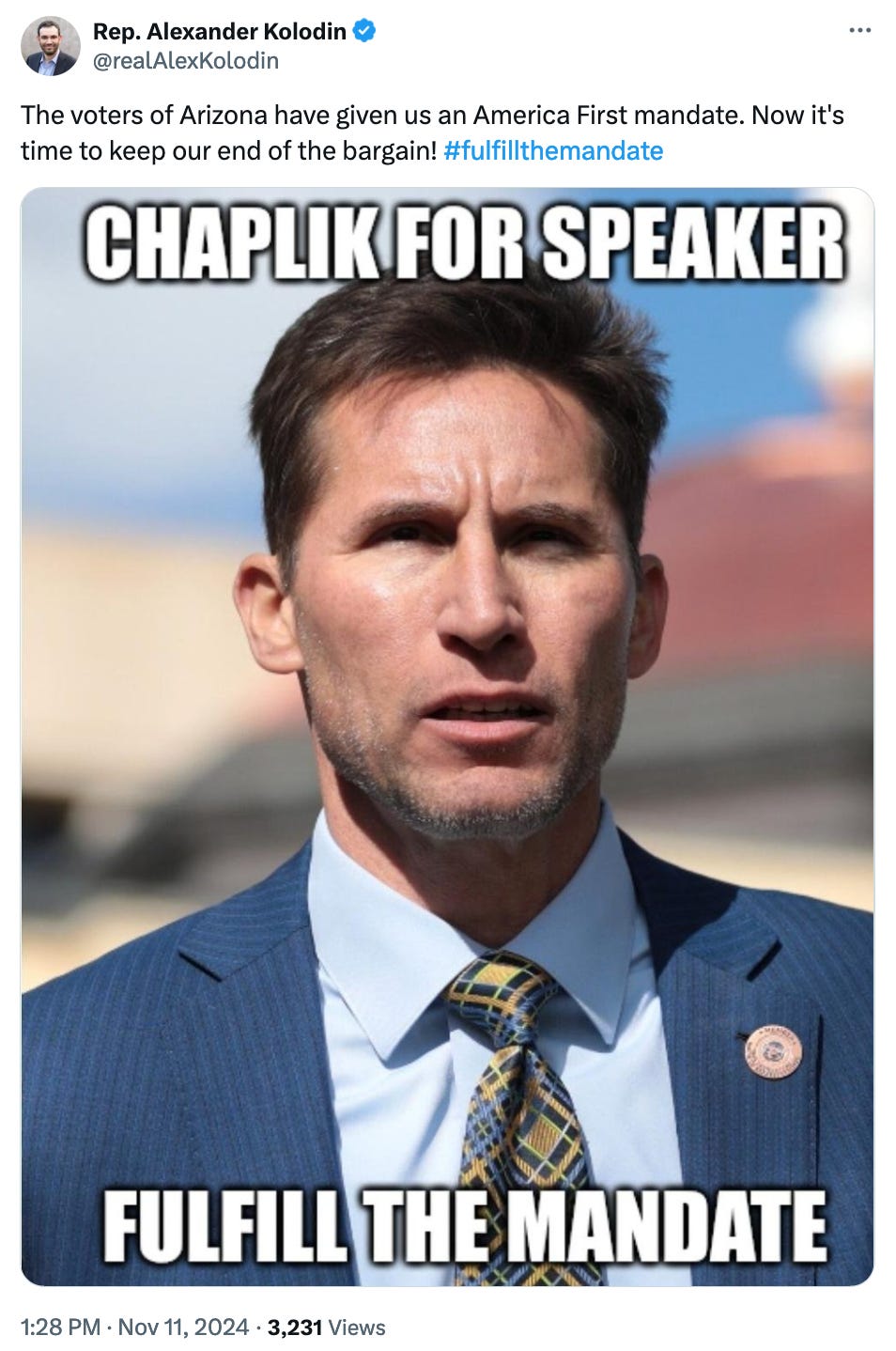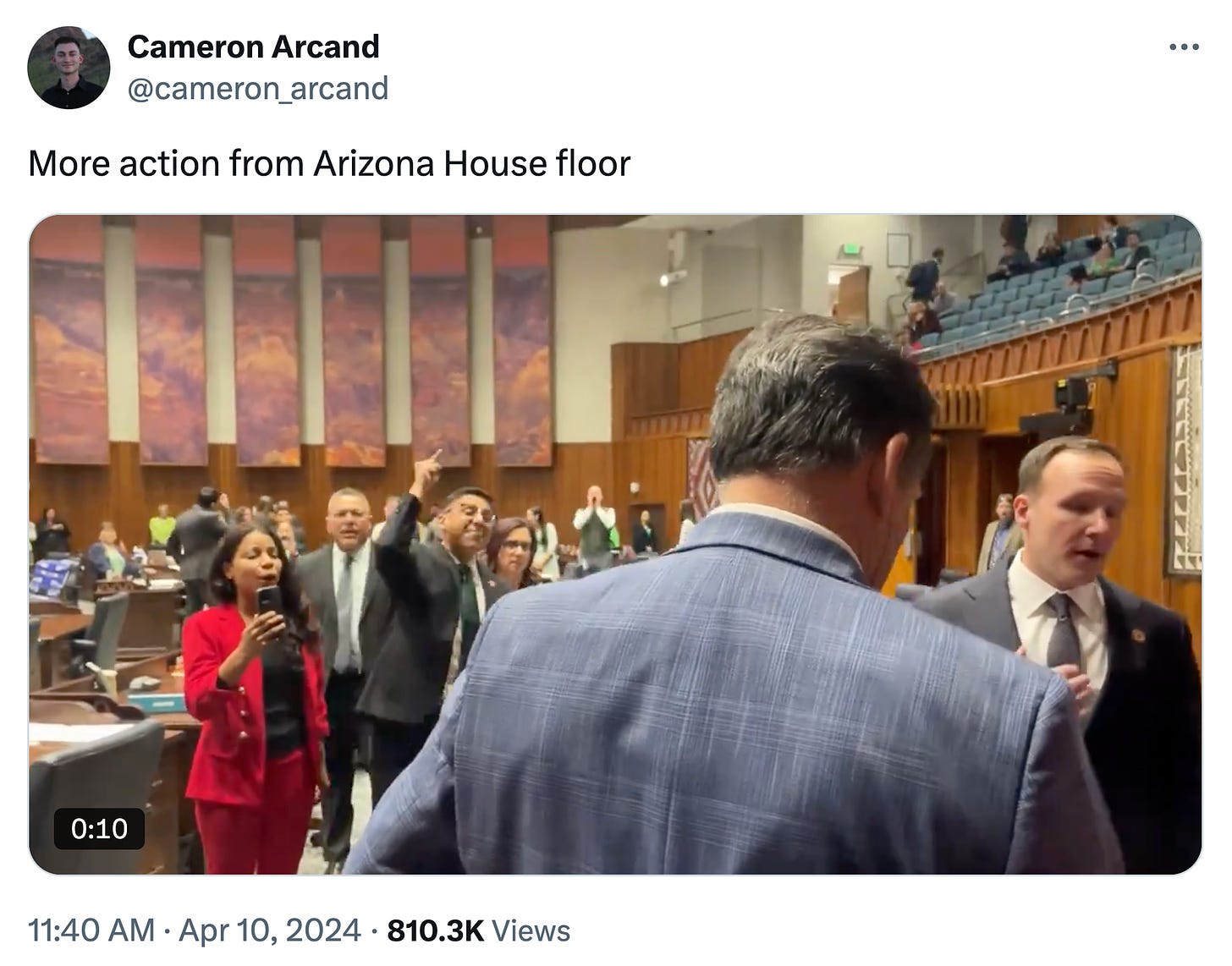Battle for the gavel
Lawmakers electing lawmakers … Calling the races … And another reporter goes down the rabbit hole.
Officially, nobody has won the 2024 election yet.
But presumptive state lawmakers are already making their first big decision as elected officials today when they’ll meet in private to vote for the next House speaker and Senate president.
The closed-door election is always subject to wild speculation, and the campaigns have been going on for months.1
Lawmakers play their cards close to their chest during these semi-secret internal competitions, even attempting to keep the time and location of the elections under wraps.
But who gets that gavel has big implications for voters too.

The president and speaker are by far the most important positions.2
They control everything, from their chamber’s budget, to staff contracts, to lawmakers’ committee assignments. Not to mention the flow of legislation, including which bills get assigned to which committees.
The minority leader position will determine the tone and tact that Democrats take in dealing with the larger Republican caucus next year. And after last week’s big losses, Democrats will have to decide whether they want to be led by combative progressives or conciliatory moderates.
Lawmakers will also elect new majority leaders and assistant minority leaders, who set caucus priorities and keep their caucus-mates in line, and new Republican and Democratic whips,3 who are responsible for “whipping” votes for the party’s priorities.
House Republicans
After former speaker Ben Toma left the Capitol to run for Congress, three names have emerged to take over the top leadership spot
Current Majority Leader Leo Biasiucci, Rep. Steve Montenegro and Rep. Joseph Chaplik all want to be the next House speaker.
Chaplik, head of the Freedom Caucus faction of legislative Republicans, lost the speaker spot to Toma in 2022. And while the MAGA victories at the ballot may boost his chances, he’s not widely viewed as the frontrunner.
Instead, we hear that Montenegro and Biasiucci are the top contenders heading into this morning’s election.
And Biasiucci may have the edge, as rumors persist that he and Chaplik have formed an alliance to have Freedom Caucus Republicans back Biasiucci if Chaplik can’t win. Meanwhile, word is that current Majority Whip Teresa Martinez wants to move up in the ranks to become majority leader, the second-in-command position. Rep. Michael Carbone is also interested,4 but both lawmakers will have to stave off a bid from Justin Olson, a former state representative who served from 2010-2016 until former Gov. Doug Ducey appointed him to the Arizona Corporation Commission in 2017. Olson lost two congressional bids in 2014 and 2022, and now he’s ready to rejoin the state legislative ranks. But he’s still a remembered and highly respected voice among Republicans.
And we’re hearing Rep. Julie Willoughby is interested in taking over as whip next year.
House Democrats
When we asked Lupe Contreras, the current House Democratic leader, if he plans to run for reelection, his answer was literally unbelievable.
“Honestly, at this point, I haven’t even thought about it,” he claimed on Friday.
We hear he’s not seeking reelection as the leader of the House Democrats, but if he does want to keep his position, he’s in for a fight. Three contenders want the gig for themselves: Reps. Cesar Aguilar, Oscar De Los Santos and Consuelo Hernandez.
De Los Santos represents the liberal wing of the party, and he seems to be the odds-on favorite to take over. He rose to prominence last year after shouting down Republicans when they refused to debate a repeal of Arizona’s territorial-era abortion ban.
Hernandez is one of three siblings in her family to have served in the Legislature, all of whom have represented the more moderate wing of the Democratic caucus.
After Democrats’ nationwide loss on November 5, Hernandez is making the case that Democrats need to learn to work with Republicans.
Her track record lends itself to compromise, she said, while De Los Santos’ record shows he antagonizes Republicans to the point of earning ethics complaints.
Meanwhile, Aguilar’s campaign pitch centers on his experience living and working in communities across Arizona. He says he knows the people on the ground and how to win campaigns, having worked for Democrats like Ruben Gallego, Kate Gallego and Adrian Fontes, among others.
Aguilar is trying to cut something of a middle path between the two other candidates, saying, while he has his own hopes of what a progressive Arizona could look like, Democrats have to deal in reality.
“If we want to be important as minority party, … we need to work with the other side, especially because we’ve lost some seats,” he said.
Also, Rep. Nancy Gutierrez, the current minority whip, wants to be assistant minority leader. But Aguilar is willing to challenge her for it if he doesn’t get the top spot, some legislative sources told us.
We haven’t heard who may be in the running for Democratic whip.
Senate Republicans
Current Senate President Warren Petersen will likely retain his position in recognition of his success in keeping Republicans in control of the Senate.
We’ve heard rumblings Sen. David Gowan may mount another challenge after narrowly losing the presidency to Petersen two years ago. Gowan was widely viewed as a potential president if Democrats had split the Senate. But the Republican majority seemingly grew instead, heightening Petersen's leadership status.
Senate Republicans told us Sens. John Kavanagh and Janae Shamp want to be the next majority leader, which is in charge of coordinating the caucus, rather than overseeing the entire chamber.
Kavanagh said he’s the best fit for the job because of his legislative experience and because he’s been “one of the public voices in the media promoting the Republican caucuses’ positions.”
In his return to the Legislature, Mark Finchem seems to be vying for majority whip alongside Sen. Frank Carroll.
Senate Democrats
Sen. Mitzi Epstein currently leads Senate Democrats, but it’s unclear if she’s making another run at the position.
And sources told us that Sens. Brian Fernandez, Catherine Miranda and Priya Sundareshan definitely want the spot next year.
But Democratic Rep. Alma Hernandez isn’t letting her Senate colleagues forget Fernandez’s misogynistic comments about her in 2022.5
And Sundareshan, who co-chairs the Arizona Democratic Legislative Campaign Committee, might have a harder time making an argument for the position. The ADLCC is dedicated to getting Democrats elected to the state Legislature, and after Democrats’ dismal showing this year, her caucus may not want to reward her with a leadership position.
Meanwhile, Miranda hasn’t always been the most popular member of her caucus, thanks to her moderate beliefs and willingness to work across the aisle.6 Her pitch to her colleagues revolves around her relationship with Republicans and her ability to work with them to make their bills “governor-friendly.”
Election officials counted more than a half-million ballots since we last updated you on the state of the races on Friday morning.
Now, we’re down to 180,000 ballots left to count across the state, and almost every race is now close enough to call.
Donald Trump won Arizona, per the Associated Press, which called the race Saturday night.
Ruben Gallego won the U.S. Senate seat, per the AP, which called the race last night.
Republican U.S. Rep David Schweikert won reelection in Arizona’s competitive Congressional District 1, per the AP.
But the AP hasn’t called U.S. Rep. Juan Ciscomani’s race in Southern Arizona’s CD6, which he’s leading by about 4,900 votes, since Pima County still has about 63,000 ballots to tabulate. But Decision Desk projected him as the winner.
If Ciscomani does pull it off, that would put Republicans in control of six of Arizona’s nine congressional seats.
Republicans won all three seats on the corporation commission, leaving Republicans in control of five7 out of five seats on Arizona’s utility regulation board.
Republicans seemingly won five out of the six competitive state Senate seats, meaning they would increase their majority to 17 of 30 seats.
However, we’re not quite ready to count out Democratic Senate candidate John McLean in Southern Arizona’s Legislative District 17, considering he’s only down by about 1,600 votes and Pima County still has 63,000 ballots left to count.
Democrats seemingly won only four out of 14 competitive state House seats, increasing the Republican majority in the House to 33 members from 31.
And in two of those state House seats, the Democrats are leading by less than 1,000 votes, so there’s a chance they could still lose more seats.
Republicans made a clean sweep of nearly every major position up for grabs in Maricopa County — the recorder’s office, sheriff, county attorney, superintendent of schools, and at least two of the three seats up for grabs on the board of supervisors.
One seat on the board, however, remains too close to call. Republican Kate Brophy McGee is leading Democrat Daniel Valenzuela by just 309 votes.
Maricopa County still has an estimated 44,000 ballots to count.
We recently caught an episode of legendary podcast producer Brian Reed’s latest endeavor that gave us some serious flashbacks.
Reed, who hosted the Peabody Award-winning “S-Town” podcast, has spent the last three years chasing a story that we know a little about.
He had hoped it would be part of a whole deep-dive series. But that longer series didn’t pan out.
So on the eve of Election Day, Reed dropped the short version of the years-long conversation he’s had with the subject of that series he never did: Arizonan Staci Burk.
Early subscribers will remember that name from our very first edition — a deep dive into Burk’s life as a leading election conspiracist turned crusader against the Big Lie about election fraud.
“In an alternate version of my life, what I would have been releasing this fall — instead of this show that you’re listening to right now about me crying into my beer over what could have been — was Staci Burk’s story,” Reed says in his podcast.
Burk’s tale is wild, and we know the feeling of wanting to go deeper, as we told our fans on Reddit recently.
It was a great episode that gave us some insight into what Burk is thinking now, including when Reed confronted her about why she’s not more upset at Trump for lying to her and the American people.
“Yeah, (but) would he be the first politician that ran on a platform of lies?” she replied.
Ultimately, Reed didn’t cover much new ground that we hadn’t dug up three years ago.
And sadly, Reed didn’t bother to link to or mention our groundbreaking piece other than to say the New York Times, ProPublica and Raw Story had covered Burk’s story (after we had), and “some local Arizona reporters” had also written about her.
It’s not the first time we haven’t gotten credit from the national press.
Anyway, support local, independent journalism that informs the national conversation.
“Campaigning” for leadership usually means organizing fundraisers with lobbyists for the candidates, making connections for them, offering advice or otherwise helping them win their races.
Technically, the House speaker and Senate president are not elected by their caucuses, but by the entire chamber. In practice, however, after House Republicans agree on a speaker, they’ll vote as a bloc in January to elect the next speaker. Same for Senate Republicans electing the next president.
Fun fact: The “whip” title comes from the phrase “whipper-in,” which British fox hunters used to keep foxhounds from leaving the pack. Another fun fact: They also have the important job of assigning parking spaces.
We hear that after Republican Rep. David Cook lost his primary election to Sen. Wendy Rogers, he was stumping for Carbone as majority leader, which left some Republicans scratching their heads.
Fun fact: The Senate Democratic Caucus contains only two men.
CORRECTION: A previous version of this post said Republicans will control four of the five seats on the Corporation Commission. It’s all five.









Republicans now have all five seats on the ACC.
Please stop writing about Stacey Burk, a drama queen with whom I served on the Gilbert School Board. In her one 4-year term, she caused the district to lose two superintendents, two overrides, and go down to state funding only. Gov. Brewer had to call her from China to get her vote for the Apple factory. Her antics are not newsworthy.